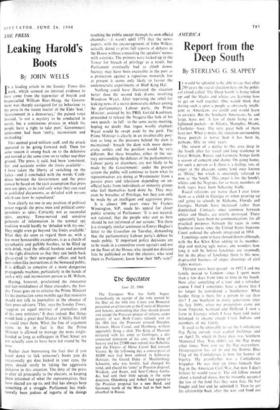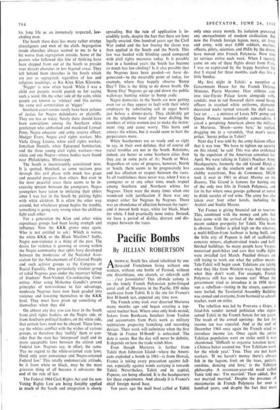AMERICA
Report from the Deep South
By STERLING G. SLAPPEY
TT would be splendid to be able to say that after 1250 years the racial situation here on the politi- cal island called 'The Deep South' is being tidied up and the blacks and whites are learning how to get on well together. One would think that during such a span a people as obviously intelli- gent as Americans are could and would learn to co-exist. But the Southern Americans, by and large, have not. A few of them living in en- lightened pockets—in Atlanta, Memphis, Miami, Charlotte—have. The very great bulk of them have not. What is more, the situation surrounding those pockets is worse than it has been in, perhaps, fifty to sixty years.
The return of a native to this area deep in the South after far travel and long residence in Great Britain. Russia and Germany brings forth a season of concern and shame. On going home. for such a person as I, there is a feeling, too, of anger at the pleasant, sunny land once known as 'Dixie,' but which is sneeringly referred to now as 'the South.' This anger is for the South's whites and the Negroes, for so many members of both races have been behaving badly.
Racial relations are worse than I ever knew them as a child in Georgia or when growing up and going to schools in Alabama, Florida and Georgia. Hatreds have increased rather than diminished. Contacts, once common between whites and blacks, are utterly destroyed. There apparently have been no communications for all practical purposes between the races in some Southern towns since the United States Supreme Court ordered the schools integrated in 1954.
Lynchings seem to have slowed down (although, with the Ku Klux Klan adding to its member- ship and making ugly noises, one wonders how long it will be before lynchings are resumed), but in the place of lynchings there is this new, disgraceful business of sniper shootings of civil rights workers.
Thirteen years have passed--in 1952 I and my family moved to London—since I spent more than a few days from time to time in the South. Now after something of a tour and a refresher course I find I sometimes have a desire that I no longer be considered a Southerner. What harder thing is there for a person to say than this? I am Southern in every generation since the late 1600s, when my progenitors came out from England, Scotland and Holland. I own a farm in Georgia which I have been told never belonged to anyone except Creek Indians and members of my family.
It used to be enjoyable to see the Confederate flag flying outside state capitol buildings and on April 26. which in those days was Southern Memorial Day. You didn't see the flag many other times. Now you see the flag everywhere. Desegregation has set in and the Bonnie Blue Flag of the Confederacy is now the banner of bigotry. My grandfather was a Confederate brigadier. He was shot six times beneath that flag in the American Civil War, but now I don't believe he would raise it. The old fellow owned about a hundred slaves, but he instantly accepted the law of the land that they were free. He had fought and lost and he admitted it. Then he got his citizenship back after the war and lived out
his long life as an immensely respected, law- abiding man.
The South these days has many rather strange churchgoers and men of the cloth. Segregation inside churches always seemed to me to be a bit worse than segregation outside. Some of the pastors who followed this line of thinking have been shipped from out of the South to preside over distant churches in less bigoted areas. They left behind them churches in the South which are just as segregated, regardless of law and religious teachings, as Ku Klux Klan Klaverns.
`Nigger' is now often heard. While I was a child our parents would punish us for saying such a word. On the other side of the coin, white people are known as 'whiteys' and this carries the same evil connotation as 'nigger.'
Southern court-rooms rarely have been palaces of justice for Negro defendants or plaintiffs. They are less so today. Surely there should have been convictions among the Southern white gentlemen who ambushed and murdered Lemuel Penn, Negro educator and army reserve officer; Medger Evers, Negro civil rights worker; Mrs Viola Gregg Liuzzo, white civil rights worker; Jonathan Daniels, white Episcopal Seminarian, and the three young civil rights workers—two white and one Negro—whose bodies were found near Philadelphia, Mississippi.
The South is inconsistently constituted now. It is spotted, blotched, as some sections pass through this evil phase with much less grace and peaceful progress than others. But even in the most peaceful areas there seems to be in- creasing tension between the youngsters. Negro youngsters have taken to imitating their elders since I was last in the South by picking fights with white children. It is often the other way around, but whichever group begins the trouble, something is going very wrong when the children fight each other.
For a generation the Klan and other white supremacy groups had been losing strength and influence. Now the KKK grows once again. Who is not entitled to ask : Which is worse, the white KKK or the Black Muslims? Sadly, Negro non-violence is a thing of the past. The desire for violence is growing so strong within the Negro community that splits have developed between the moderates of the National Asso- ciation for the Advancement of Coloured People and such activist groups as the Congress of Racial Equality. One particularly virulent group of rabid Negroes goes under the incorrect billing of Students' Non-Violent Co-ordinating Com- mittee. After using Mahatma Gandhi's proven principles of non-violence to fair advantage, moderate Negroes have now been goaded into violence and lowering themselves to the KKK level. They must have given up something of themselves when they did.
On almost any day you can hear in the South from civil rights leaders, on the Negro side, or from Southern political leaders, on the white side, that certain laws need not be obeyed. These laws, say the whites, conflict with the wishes of various groups, so therefore they 'nullify' them or con- sider that the state has 'interposed' itself and its more acceptable laws between the citizen and Federal law. Negroes say, in effect, the same. 'Pay no regard to the white-oriented state laws. Heed only your conscience and Negro-oriented Federal law.' This totally undemocratic attitude, be it from white or black, may be the most grievous thing of all because it advocates the end of the rule of law.
The Federal 1964 Civil Rights Act and the new Voting Rights Law are being forcibly applied in much of the South and integration is slowly spreading. But the rate of application is in- credibly tardy, despite the fact that these are laws legally enacted. One hundred years ago the Civil War ended and the law freeing the slaves was then applied in the South and the North. This law was heeded with blinding speed compared with civil rights measures today. Is it possible that in a hundred years the South has become so much less law-abiding? Is it also possible that the Negroes have been goaded—or have de- generated—to the miserable point of today, for example, where they happily observe 'Bump Day'? This is the thing to do down South. On 'Bump Day' Negroes go up and down the public walkways hunting whites to bump aside.
Negro domestics in the South are now getting even (or so they appear to feel) with their white employers by substituting salt in sugar bowls just before a dinner-party. They childishly get on the telephone hour after hour dialling the numbers of white women just to make the instru- ment ring and cause worry. This hurts and annoys the whites, but it would seem to hurt the perpetrators more.
White Southerners are so ready and so right to say, in their own defence, that of course all racial troubles are not in the South. Relations, indeed, are better in some Southern cities than they are in some parts of ths• North or West. Regardless of rates of progress, however, North or South, there seems to be progressively less and less affection or respect between the races. In all truthfulness there never was, when I was a youngster or at any other time, much respect among Southern and Northern whites for Negroes. There were the many times when one wondered with justification if there was any respect either for Negroes by Negroes. There was an abundance of affection between the races: and it moved both ways, white for black, black for white. I find practically none today. Instead, we have a period of dislike, distrust and dis- respect between the races.















































 Previous page
Previous page